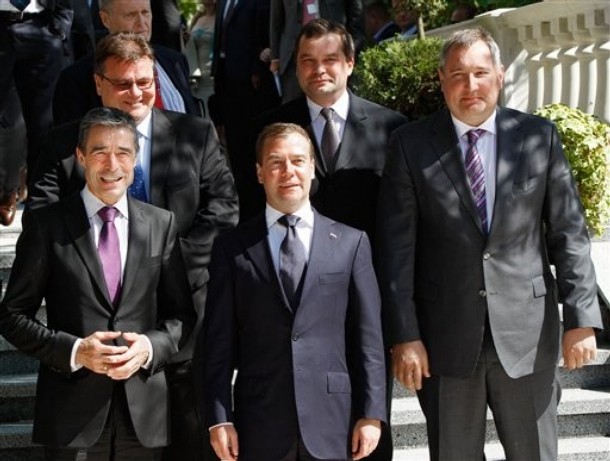
From Charles Clover, the Financial Times: On Tuesday, Anders Fogh Rasmussen, Nato’s secretary-general, sought to defuse mounting tension following a cantankerous Nato-Russia summit on Monday , where Dmitry Medvedev, Russian president, tried to persuade Nato to issue a legal guarantee that the new system, called the Phased Adaptive Approach, would not neutralise Russia’s nuclear deterrent.
Mr Rasmussen dismissed the Russian threats of a new arms race – which have appeared in press reports in recent days – as part of “a normal negotiation process”.
In an interview with the Financial Times, he said: “What you see in the media is what you will see in any political process. That people position themselves, that they make their point of departure clear.”
His comments come a day after Dmitry Rogozin, Russia’s Nato ambassador, suggested in the Moscow newspaper Kommersant that failure to take Russian objections into account could cause Moscow to withdraw from the New Start treaty on nuclear arms limitation, signed in 2010, and could provoke it to move its missile forces closer to Nato borders.
The threats were reminiscent of 2007 when Russia said it would deploy cruise missiles in the western enclave of Kaliningrad, a step which was ultimately called off after Barack Obama, US president, scrapped plans to deploy a different version of the anti- missile shield in Poland and the Czech Republic in 2009.
Russia historically has distrusted the aims of US anti-missile defence, which the US insists is aimed at missiles Iran is said to be developing. Moscow argues it could render its nuclear deterrence ineffective and make it vulnerable to a Nato first strike.
However, US officials say they have repeatedly demonstrated that such a system would be of no threat to Russian intercontinental ballistic missiles (ICBMs). Being located close to Russia makes it harder for interceptors to catch up to Russian missiles, they insist. “Russian objections are not really about physics or geometry or technical capabilities. They’re about politics,” said Eric Edelman, former undersecretary of defence for policy under Mr Bush. “Having this in their backyard is anathema to them.” (photo: AP)
Image: ap%207%206%2011%20Anders%20Fogh%20Rasmussen%20Medvedev%20Rogozin_0.jpg
